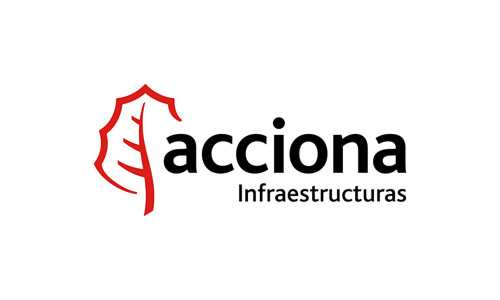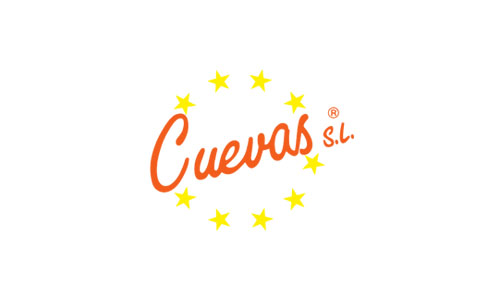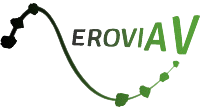The commitee responsible of the project development is formed by three enterprises, everyone capable of facing the important technological challenges set out by the different activities considered on it, since they have a wide knowledge, ability and experience in different technological and industrial sectors. Furthermore, it is worth mentioning these companies complementarity, as they encompass different sectors on which each one is set as a reference in its respective national market.
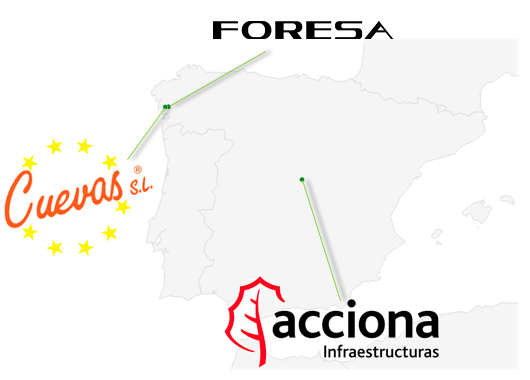

ACCIONA Infraestructuras S.A.
ACCIONA Infrastucture, S.A. is the head of the Construction Division of ACCIONA, company resulting from the merger of two major Spanish construction companies in 1997: Entrecanales and Tavora, S.A. and Cubiertas and MZOV, S.A., founded in 1931 and 1978, respectively. The origin is in Galician MZOV (Railway Company from Medina del Campo to Zamora and from Orense to Vigo), founded in 1862 in Galicia. The solid development of the parent companies has turned ACCIONA Infrastructures to be one of the leading companies in the construction sector in Spain, in addition to an outstanding international presence currently extended over more than thirty countries.
ACCIONA Infrastructure encompasses all aspects in construction, from engineering to execution of works and subsequent maintenance. It is also involved in the management of public works concessions, in particular in the transport sector (roads, motorways and railway lines) and building, including hospitals and schools. The company operates two main business lines: public work and building, always considering its values, which are:
- Sustainability. ACCIONA Infrastructure respects environment. All of its actions are carried out having regard to overall sustainability.
- Social commitment. With its activity, ACCIONA Infraestructure seeks to improve the quality of life in the communities where it operates.
- Innovation. ACCIONA Infrastructure supports technical excellence developing and using the very latest and most innovative construction systems in its works.
- Experience. More than 100 years of activity and hundreds of projects support ACCIONA Infrastructure experience.
- Internationalization. Present in more than 30 countries spread over the five continents, ACCIONA Infrastructure is firmly committed to international consolidation and expansion as a central element of its development and growth strategy.
In 1992, the R&D Department was created in order to manage all its investigation and technical development tasks carried out until that moment. As from this date, the investigation area has increased, establishing the major lines of action in which intense work has been carried out throughout these nearly twenty years.
At present, the R&D Department has been renamed Technology & Innovation Division of ACCIONA Infrastructure, dividedinto five research areas: Materials, Infrastructure, Sustaintibility and eco-efficiency, ICT and automatisms, Implantation and Innovation. Gathering more than 150 professionals from different careers and nationalities, highly qualificated (Civil Engineers, Telecomunications Engineers, Aeronautical Engineers, Electronic Engineers, Mining Engineers, Computer Specialists, Biologists, Physicists, Chemists , etc), who see R&D as an incentive for change able to motivate human capital in order to generate new ideas that improve the production performance parameters, the quality of our products and services and the satisfaction of our employees and customers, and who develop their day-to-day activities in 11 laboratories, among which we can highlight the followings: Nanotechnology and advanced materials laboratory, integration of air conditioning and renewable sources in buildings laboratory, ICT and augmented reality laboratory or chemical analysis laboratory. There is also an attached building which houses three workshops in more than 1200m2 used for creating scale prototypes and testing materials. All this aspects makes us the leading construction company in R&D in Europe with more than 20 years of experience developing new building technologies, becoming also the first construction company in Europe having its own Technology Centre.
As a result of this business philosophy, ACCIONA Infrastructure holds a leading technology position among the major European Construction and Services companies, which has led the company to be a member of the High Level Group in European Construction Techology Platform and heading the National Construction Platform. It is worth noting that, according to R&D European Industrial Scoreboard, developed by DG Research in 2011, the company is ranked at the top of the Spanish companies in this sector in terms of investment on R&D.
On the other hand, in 2011, ACCIONA activity in R&DI was recognised by different institutions as the European award in Innovation in Composite Material in public Works, given by JEC Composites, for the construction project of Almuñecar footbridge.
ACCIONA Infrastructure cooperates with public entities related to science, education, economy, infrastructures, housing, culture and environment, defining the most efficient and sustainable strategies for the purpose of achieving the objectives of social welfare and economic growth in our society.

FORESA
It is the Chemical Division in FINSA group (Timber Industry SA) and its major activity is based on the manufacturing of formalin and aminoplastic thermosetting resins for wood-based panels industries.
FORESA was founded in Caldas de Reis (Pontevedra) in the 1960s belonging to TAFISA group. Later, FINSA was incorporated into its shareholding, and in the 90s FORESA was owned by FINSA. At present FORESA encompasses three centres of production: in Caldas de Reis (Spain), in Bordeaux (France) and in Aveiro (Portugal).
The range of products manufactured in FORESA can be summarised as follows: formalin based resins for wood boards, fibreboards or particle boards, phenolic resins for plywood, thermal and sound insulation, production of fibre boards used in the automotive sector, resins for foundry moulds, polyvinyl acetate resins for the packaging sector, cardboard, paper, wood, etc., paint for the wood-based panel sector, resin catalyst and formaldehyde catchers, flame retardant disperson, moistening and titanium dioxide dispersión for impregnation on paper, catalysts for diesel (NOx catcher), urea solution and several additives for various uses and additives acting as nutrient in water purification.
FORESA R&D Department acts as a motor and link within all this wide range of products developed with its own technology and staff. The Directorate of R&D in FORESA is involved in officially approved projects in regional, national, European and, occasionally, Latin American programmes. FORESA has a sofisticated analytical instrumentation for control and analysis of polymers, and in addition, it has a pilot plant where they can make on a small scale the great majority of the products these new developed resins are destined for.
The R&D Department encompasses the Techical Support Service for all our clients, who recognise FORESA as a reference centre, both for final product testing and for developing specific products designed to cover their particular needs. At present, the major lines of R&D are focused on Vinyl-veova resins for polymer emulsion, copolymers resulting from them, acrylic resins and styrene – acrylic for paint industry, textile industry…, obtaining state-of-the-art formaldehyde catchers, improving quality whilst complying with the strict environmental requirements in force, and natural resines synthesised from natural sustainable renewable raw materials which pursue a sustainable response to the creation of solutions for economic development and social organisation.
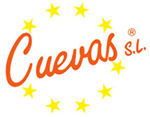
Metalúrgica Cuevas
Its main area of business was the manufacture and assembly of metal structures and boilers. However, nowadays it focuses its activity in a wide range of activities such as design, manufacture and assembly of metal structures, large dimensions storage tanks, production of all types of pressure vessels and boilermaking works as well as industrial maintenance of manufacturing plants.
In accordance with the industrial maintenance activities, Cuevas Metallurgical designs and manufactures the equipment for the improvement and optimization of production processes. Cuevas Metallurgical is concerned about adaptation and reorganising in order to carry out new activities in line with the constant industrial development and the emergence of new technologies.
At present quality is one of the characteristics of our product, in addition to colour, the material used, hardness, price, service, compliance with delivery dates and reliability agreement. Therefore, quality is a feature which our company considers to be essential.
Partner Organizations
On the other hand, the current project foresees the outsourcing of a number of research organizations, all of them recognised for their work and experience, as well as for the research resources they have:

Canary Islands Foundation of the Technological Institute and Renewal Energy S.A.
Founded in 1990 by the Tenerife Island Council, ITER was born in order to meet a need of starting a new field of reseach in the Islandsto contribute to reduce the dependence on external energy supply and to allow a cleaner and more sustainable development. In order to comply with this purpose, its aims are to promote research and technological development work related to the use of renewable energies, as well as other interests in regional socio-economic development: groundwater resources, seismic and volcanic surveillance and prediction, environmental control, and development of information and communication technologies.
The following activities are primarily entrusted as part of its social objective:
- Implementation and promotion of research in the field of renewable energies or related to them.
- Development of technological systems in order to use renowable energies.
- Creation of infrastructure necessary for the development of local research, engineering and industry.
- Development of results for local industry, and know-how export to other countries and archipelagos.
- Strengthening links with scientific community at both national and international levels.
- Training of scientific personnel in all the fields related to renewable energies.
The main activities of ITER are:
- Electricity generation from renewable energies (photovoltaic solar power and wind power).
- Research and development projects into renewable energies, environment and engineering.

University of Santiago de Compostela
The University of Santiago de Compostela (USC) has a Vicechancellorship for Research and Innovation which coordinates all the activities related to R&D&I. Its main tasks are to develop a R&D plan for the University, to diffuse its progress in scientific knowdelge made by the USC into society and ensure the transfer of research results to public and private sectors.
The Vicechancellorship is divided into two large areas:
Research and Technology Office (OIT – Spanish Abbreviation) which comprises the management and support of:
- Research funding.
- Regional, national and European projects.
- Financial management
- Hiring
Valuation, Transfer and Entrepreneurial Area which encompasses the management and support of:
- Intellectual and Industrial Property
- Transfer to production sector and society.
The General Services to Support Research are part of the Network of Infrastructures to Support Reseach and Technological Development (RIAIDT – Spanish Abbreviation). The aim of RIAIDT is to give more unity and effectiveness to the research support resources of USC. Their functions are:
- To support research of own researchers and from other public or private centres, within the framework of established agreements, treaties or arrangements.
- To develop the methodological reseach of methodological techniques required to improve and expand performance.
- To advise the university community in reference to its sphere of activity and disseminate its services.
- To train researches in techniques introduced in the network units and areas in order to make the most of the potential of infrastructure.
The research activity is made by research groups located, principally, in Departments. There are also Specific Centres and Research Institutes such as:
Research Institutes
- Institute of Galician Language (ILG – Spanish abbreviation)
- Institute of Aquaculture
- Institute of Agricultural Biodiversity and Rural Development (IBADER – Spanish Abbreviation)
- Institute of Ceramics
- Institute of Education Science (ICE – Spanish abbreviation)
- Institute of Forensic Science “Luís Concheiro”
- Institute of Neurological Science “Pedro Barrié de la Maza”
- Institute of Criminology
- Institute of Industrial Law
- Institute of Studies and Development of Galicia (IDEGA – Spanish abbreviation)
- Institute of Industrial Pharmacy
- Institute of Food Research and Analysis
- Institute of Technological Research
- Institute of Mathematics
- Institute of Orthopaedics and Bank of Musculoskeletal Tissues
- Institute of High Energy Physics of Galicia
Specific Research Centres
- Research Centre in Chemical Biology and Molecular Materials
- Research Centre in Molecular Medicine and Chronic Diseases
- Research Centre in Information Technology
The University Library is one of the units which supports the research activity conceived as a bibliographic resources centre for teaching, research, study and learning.

University of Vigo
The University of Vigo has a Vicechancellorship for Reseach which directs the scientific policy, activities of promotion, diffusion and management of research, development and innovation. For this purpose, it exercises competences on:
Proposal and formalization of all types of research grants, both internal and external.
Authorisation and signing of contracts and agreements.
Proposal for infrastructure and equipment.
Institutes and Research Centres
Research Results Transfer
Management and coordination of all research resources
The Vicechancellorship, in the development of its functions, is supported and advised by the Research Comission at the University of Vigo, which receives management and administrative support by the following units:
Deputy Manager’s Office for Research Planning and Management.
Research Results Transfer Office (OTRI – Spanish abbreviation)
Support to Research and Development
Support Unity for Research Centres
Research activity is carried out by several reseach groups at the following university centres:
Scientific and Technological Assistance Research Centre (CACTI)
Toralla Marine Science Station (ECIMAT)
Research, Transfer and Innovation Centre (CITI)
Technological-Industrial Research Centre (MTI)
Biomedical Research Centre (CINBIO)
Centre for Information and Communication Technologies (AtlantTIC)
The Library and the Publications Service also depend on the Vicechancellorship
